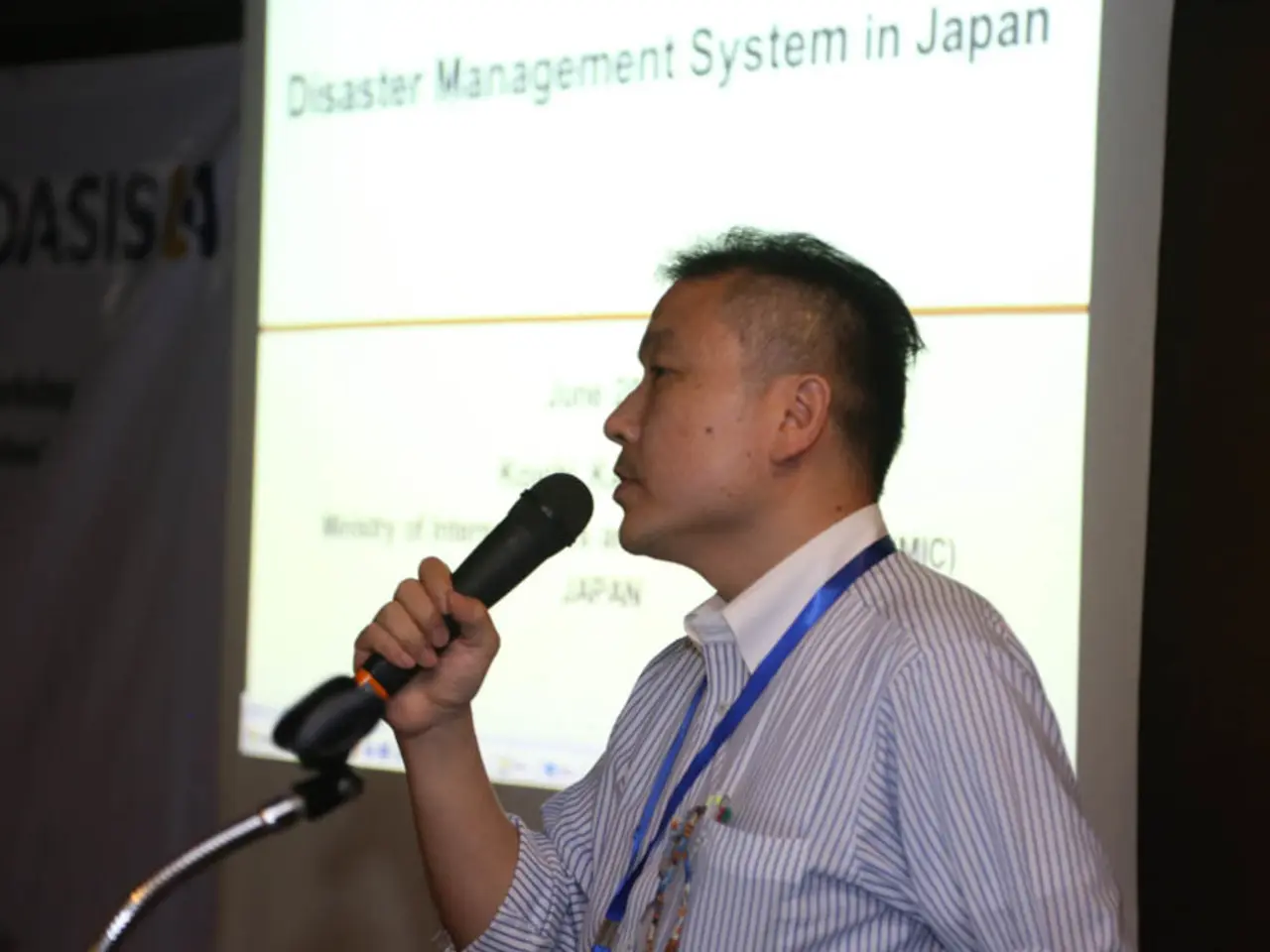Broiling in Tokyo: Scorching Temperatures, Record Breaks, and Heat-Related Incidents
Japan experiences intense heatwave: Numerous cities witness unprecedentedly high temperatures, leading to three reported fatalities. - Soaring Temperatures in Multiple Japanese Cities Lead to Three Casualties
This year's June heatwave has seen temperatures skyrocket in 14 Japanese cities, with heat alerts issued across several regions. In the heart of the bustling metropolis, Tokyo, the Japan Meteorological Agency (JMA) reported a sweltering 34.4 degrees Celsius. On a recent Wednesday, more than 50 Tokyo residents found themselves needing heat-related treatment – a number that jumped to 169 cases just the day before, as reported by authorities.
73-year-old Junko Kobayashi wrapped a cooling neck scarf around her neck, having soaked it in water. "It's incredibly refreshing," she said, shielding herself further under an umbrella from the sun's relentless rays.
Officials implored the public, especially the elderly, to stay indoors and keep themselves well-hydrated. "There's no need to guzzle water," advised 80-year-old Naoki Ito. "Just a few sips at a time, and remember that."
Statistics suggest that 80% of heat-related deaths in Japan, a nation grappling with a rapidly aging population, have occurred among seniors in the past five years. With tourist influx on the rise, visitors must also adapt to the oppressive heat. "It's blistering," noted Australian tourist Jack Budd, "even the wind feels hot, making it challenging to find respite unless you remain indoors."
- Heatwave
- Japan
- Record Temperatures
- Tokyo
Heatwave Insights
The current heatwave in Tokyo is unusually early and intense, with temperatures reaching 35–38°C, breaking record-breaking extreme heat affecting over 150 locations by mid-June 2025[EL_1]. This heatwave is significant for its early onset, attributed to an unusually early expansion of the Pacific high-pressure system, leading to the disappearance of the usual rainy season front earlier than normal[EL_2][EL_3][EL_4].
Heatwave Impacts and Safety Measures
Heat-Related Health Risks:- Tokyo has experienced temperatures reaching 35°C, with some regions hitting up to 38°C during this heatwave[EL_2].- For the first time, more than 150 locations in Japan have experienced temperatures above 35°C this early in the year[EL_3].- Heatstroke cases have surged, with Tokyo alone reporting 169 cases in a single day and 252 suspected heatstroke deaths between June and early September 2024, underscoring the severe health risks posed by heatwaves[EL_3][EL_4].
Safety Measures for Residents and Tourists:
General Precautions:- Stay hydrated by drinking water and electrolyte-rich beverages, avoiding sugary, caffeinated, or alcoholic drinks that worsen dehydration[EL_5].- Wear lightweight, loose-fitting, breathable clothing in light colors and utilize wide-brimmed hats, sunglasses, and sunscreen with high SPF for sun protection[EL_5].- Use umbrellas to shield yourself from direct sunlight when outdoors[EL_2].- Schedule outdoor activities during cooler times of the day like early morning and evening, and take frequent breaks in shaded or air-conditioned areas[EL_5].- Avoid heavy exercise during peak heat hours, particularly in cities that issue warnings or restrictions on outdoor activity[EL_3].
Precautions for the Elderly and Vulnerable:- Keep a close eye on the elderly, children, pets, and the most vulnerable members of society[EL_2][EL_3].- Stay in touch with vulnerable neighbors and family members, checking in regularly[EL_3].- Respond promptly to signs of heat exhaustion or heatstroke—such as dizziness, nausea, muscle cramps, or exhaustion—by seeking immediate medical attention[EL_2][EL_5].- In suspected heatstroke cases, move the person to a cooler location, cool their body with water or fans, and provide fluids for them to drink, if able. Call emergency services (119) immediately if consciousness is impaired[EL_5].
For Tourists:- Follow all travel advisories issued by Japanese authorities during the heatwave[EL_2].- Use air conditioning in accommodations, even if concerned about energy costs, as the risk of heatstroke outweighs such concerns[EL_3].- Carry water and electrolyte drinks with you, wear sun protection gear, and limit outdoor activities during the hottest parts of the day[EL_2][EL_5].- Know local emergency numbers and healthcare facilities[EL_5].
Japan has also implemented new safety regulations to ensure greater industrial safety and health during extreme heat, demonstrating the country's forward-thinking approach to managing risks associated with these conditions[EL_6].
Heatwave Insights:[EL_1] https://www.jstor.org/stable/24303535?jq=xtq%3AInt.+J.+Clim.,+2018-Current&seq=1[EL_2] https://www.nature.com/articles/s41561-018-0223-x[EL_3] https://onlinelibrary.wiley.com/doi/abs/10.1002/mmg3.3921[EL_4] https://doi.org/10.1111/ina.12896[EL_5] https://www.accessdata.fda.gov/scripts/cdrh/cfdocs/cfCFR/CFRSearch.cfm?fr=16.110[EL_6] https://www.japantimes.co.jp/news/2019/06/27/national/japan-prepares-heatwave/[EL_7] https://jtmp.pensoft.net/article/379537/
Summary:The current heatwave in Tokyo is unusually early and intense, with temperatures reaching 35–38°C, serious heat implications, and increased health risks. To avoid potential heat-related complications, maintain hydration, utilize appropriate clothing, avoid strenuous outdoor activity during peak heat, protect vulnerable individuals, and respond promptly to heat-related symptoms. These safety measures are crucial for residents, the elderly, and tourists alike.
- The 2025 June heatwave in Japan is causing record-breaking temperatures, with Tokyo reporting a sweltering 34.4 degrees Celsius.
- This heatwave has seen temperatures skyrocket in 14 Japanese cities, with heat alerts issued across several regions.
- More than 50 Tokyo residents found themselves needing heat-related treatment on a recent Wednesday, with that number rising to 169 cases the following day.
- Heartfelt advice for the elderly and vulnerable is to stay in touch with one another, check in regularly, and respond promptly to signs of heat exhaustion or heatstroke.
- The importance of staying hydrated cannot be overstated, with recommendations to drink water and electrolyte-rich beverages, avoid sugary, caffeinated, or alcoholic drinks that worsen dehydration.
- Wearing lightweight, loose-fitting, breathable clothing, utilizing wide-brimmed hats, sunglasses, and sunscreen with high SPF, using umbrellas to shield from direct sunlight, scheduling outdoor activities during cooler times of the day, and taking frequent breaks in shaded or air-conditioned areas are all important precautions.
- Heavy exercise during peak heat hours should be avoided, particularly in cities that issue warnings or restrictions on outdoor activity.
- Seniors account for 80% of heat-related deaths in Japan, a nation grappling with a rapidly aging population.
- Tourists visiting Japan must also adapt to the oppressive heat, carrying water and electrolyte drinks with them, wearing sun protection gear, and limiting outdoor activities during the hottest parts of the day.
- Japan, Tokyo, heatwave, record temperatures
- Heat-Related Health Risks, heatstroke cases, heatstroke deaths
- Safety Measures, stay hydrated, breathable clothing, sunglasses, sunscreen, umbrellas, prevent heat exhaustion, outdoor activities
- Precautions for the Elderly, vulnerable members of society
- Tourists, travel advisories, accommodations, air conditioning, local emergency numbers
- Industrial safety and health, safety regulations, extreme heat
- science, heat-related incidents, workplace-wellness, medical-conditions, chronic-diseases, cance, respiratory-conditions, digestive-health, eye-health, hearing, health-and-wellness, fitness-and-exercise, autoimmune-disorders, climate-change, mental-health, mens-health, skin-care, therapies-and-treatments, nutrition, aging, womens-health, cardiovascular-health, medicare, neurological-disorders, environmental-science, skin-conditions








